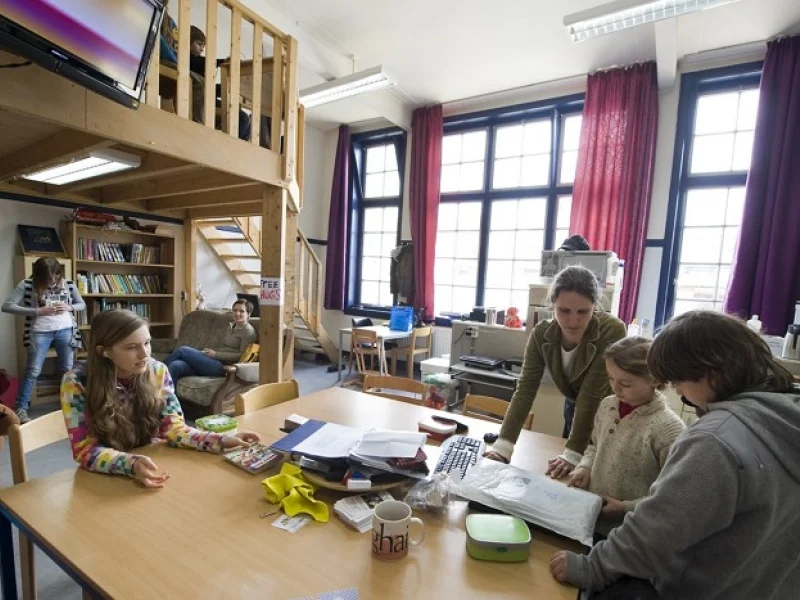Photo credits: Marina Popova
You won't see bored-looking students, doors that shut and open only when the bell rings, or teachers giving lectures. But what you certainly might find at De Vallei is any of the children sitting at the principal's desk, using the computer, while others run around the garden or read comics on a couch. If you listen carefully, you might even hear the sound of a piano coming from some corner of this school where every child has a voice in the decisions affecting him or her, is resposible of following the rules that have been decided by all, and knows that adults aren't there to impose or to judge, but to accompany and to help.
De Vallei, like many other democratic schools, was the initiative of a group of families, led by Maaike van Mourik, its current principal. As a mother, Maaike was looking for a place where her children could learn at their own pace, without pressure and with respect for their individuality. She started out in her home, with a small group of kids, including her two sons. It's now almost ten years since, and today the school –which has passed the official inspection by educational authorities and receives government funding– has some fifty students between 3 and 14 years of age, who are not segregated according to age or level: in democratic schools students can mix freely, something that has countless benefits for their intellectual and emotional learning 1.
Taking a tour of the school, we find a common room where children and adults eat, chat, read together... there's also a carpentry and arts workshop, a music room, and a playroom for the little ones. On a regular basis the school receives visitors (some of them students' parents) who come to share with the kids their knowledge and passion for activities ranging from pottery to business. Maaike explains how at this school content learning is not as important as learning what the OECD calls '21st Century Skills and Competences': learning responsibility, critical thinking, self-initiative, problem-solving and adapting to new scenarios, learning social and communicative skills, finding and selecting information, discovering your own talents and interests, and learning to learn. Learning, ultimately, how to live your life for yourself.
At De Vallei there are no compulsory lessons, and children may choose three different ways to learn: free play (a spontaneous activity, unplanned and with no prior goals, and whose results can only be seen in hindsight), discovery and mastery (these two last ones follow a plan, but are different in that discovery prioritizes the process and mastery prioritizes the result). Kids who choose to learn through mastery must know what they want to achive beforehand and must accept the responsability of attending whatever classes may be necessary to attain that goal. In this process, adults take the role of facilitators, and every child has a 'mentor' who supports him or her throughout the school year.
We have spent several hours with Maaike getting to know this school where freedom is a requisite –it couldn't be otherwise– for the learning of responsibility. But this responsibility does not seem to weigh on anybody: children and adults work together in a friendly environment where you can hear laughter, and even the sound of a piano somewhere. We come closer: a teenager is playing a classic melody. He's autistic. But here, where any time is a good time for a music lesson, that matters much less than the delicacy with which this boy caresses the keyboard.
April 14, 2014
1See Peter Gray's The Special Value of Children's Age Mixed Play and Roser Boix's Algunas reflexiones sobre el valor pedagógico del aula rural (in Spanish).


